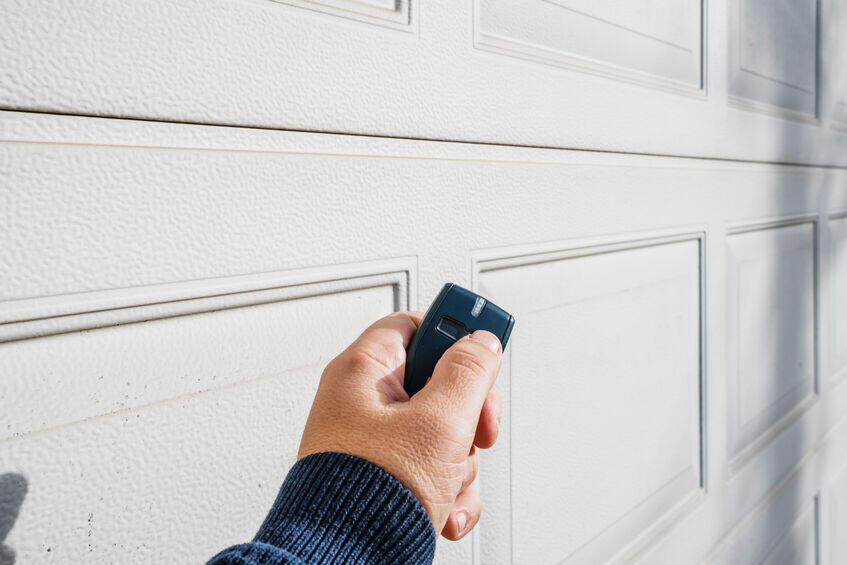Garage door openers have a tough job. They provide unmatched convenience and are essential for safe garage door operation. But not only is it about convenience and functionality, but it’s also about safety. Today, even the average garage door opener offers a range of safety and convenience features. These include features like magnetic locks, security cameras, and even Wi-Fi Connection. And yet, as with all electronics, the more complicated it is, the more chances there are for it to fail or even be hacked.
That’s right, not only do they lift and lower the heaviest door in your house on a regular basis, but they play a pivotal role in keeping you and your home safe. Garage door opener safety must be a consideration when you pick a garage door opener. Especially if you are installing a new one or upgrading from an old one. But what do homeowners have to worry about, other than the obvious malfunction or breaking down of a garage door opener?
Is Hacking a Garage Door Opener Safety Issue?
We regret to inform you that, yes, your garage door opener could potentially be hacked. The bad guys are out there and sometimes they try to break in through the garage. But don’t panic. Today, most hacking happens at the website and corporate levels. Yet, anything that is electronic or connected to the internet can be hacked. Anything that is wireless can be hacked. It all really depends on the hacker and what’s at stake. The question is: How can a hacker break into your garage door? There are some simple methods. Others are more complex. But they do exist, and we’ll cover them in today’s blog post.
First, the easiest way to hack into your garage door opener is through what is called a “HackRF Replay Attack.” How does it work? Put simply, hacker thieves use a special device to record the signal coming from the garage door opener remote. But this process is not as easy as it sounds. It will only work if your garage door opener remote uses a static signal. The hacker would also have to be within fairly close proximity to the remote or opener to receive and copy the signal. Your garage door opener safety measures are relatively robust if you use a newer model.
You basically want to avoid garage door openers manufactured prior to 1993. These types of openers were equipped with what is called a dip switch code selector. That may sound Greek, but it is essentially a static code used to transmit the signal to your garage door. They are most vulnerable to a replay attack. After 1993, however, most garage door opener OEMs switched to a newer “rolling code” technology. What does this mean? Every time you press the button on your opener remote, the code changes.
Garage Door Opener Security Evolves
The rolling code technology used in garage door openers after 1996 was not the only innovation in garage door opener security. In 1996, Chamberlain introduced a system called Security+2.0. This patented system was designed to communicate on multiple frequencies. It also employs the use of a unique code each time the garage door button is pressed. And considering there are more than 100 billion encrypted frequencies to choose from, it is highly unlikely bad guys can hack into openers of this nature.
Still, the question is: Can it be done? The answer is yes, but it is a very difficult task. Remember that there are so many potential combinations. As a result, a potential thief/hacker would need a very expensive and technologically complex device to break in. Instead, most bad guys use an easier method. And for them, hacking isn’t even required.
First, they could quite simply steal your remote. This is most definitely the old-school method. The worst-case scenario? Leave your garage door opener in the driveway attached to your visor. Bad guys could easily follow you home and stake you out. Once they realize the remote is in the car, they track your movements and that’s it. Next thing you know, you’ve come home from work, they’ve broken into your car, and are waiting for nightfall.
Can my Keypad be Hacked or Remote Cloned?
Keypad hacking is not easy. But again, this is where the old-school tactic comes in. If the criminal guesses your PIN code, then you have a problem. Consider the amount of time you tap a key. Once they begin to look worn out, thieves will try various combinations. Obviously, you don’t want to constantly change the keypad. Instead, the best option is to frequently change the code. Also, refrain from using common codes like your day of birth or 1234. The last thing you want is to make it easier for the thieves.
But what about the remote itself? Can someone clone the remote? Well, first, never let anyone else use your garage door opener remote. Why? Because most of them have a cloning ability. Your spouse or child may want to have a remote of their own in case they need to get in the house. A bad guy cloning your garage door opener remote would be a big problem. And if you need advice on a lost remote, need it reprogrammed, or need keypad advice, give us a call.
Here’s the good news. Old dip switch garage door openers are evolving into newer models, you’ll find less garage hacking. But it is still important to be on guard and realize what not to do. Paying attention to basic safety procedures is important, no matter where you live.

